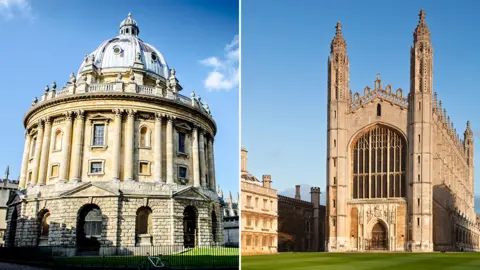Oxford and Cambridge Arc vital for economy - business leaders
 Getty Images
Getty ImagesThe dilution of the grand plan to link up the university cities of Cambridge and Oxford could damage the British economy, business leaders have warned.
The "OxCam Arc" plans included a rail link, new homes and an expressway, but the expressway was scrapped in 2021.
A letter to the government signed by 17 businesses, including AstraZeneca, said the Arc was "central to the UK's present and future economy".
The government said it was committed to investing in the region.
 Ben Schofield/BBC
Ben Schofield/BBCThe controversial Arc plans aimed to boost the economies of Cambridge and Oxford, and towns in between including Milton Keynes and Bedford, and help boosts new firms with links to the universities.
The expressway had been a key part of infrastructure plans since 2017, and the National Infrastructure Commission said the new road and the East-West Rail project had to "be built as quickly as possible to unlock land for new homes", in the area covered by the Arc.
But there was opposition from MPs, environmentalists and people living in areas marked out for development.
 BBC/Vizmaps
BBC/VizmapsNow the BBC understands that the government has lost interest in the scheme.
The Conservative MP for North East Bedfordshire, Richard Fuller, who has opposed the scheme, told BBC Politics East: "My understanding is that the OxCam Arc has been de-emphasised or flushed away.
"It was a pretext really for additional houses. For the communities to take more housing and for the connectivity to justify one million more homes.
"We are already under too much pressure from housing and that means pressure to get GP appointments or a school place.
"I think the underpinnings of the Arc failed from the start and I hope it is being downplayed."
 Ben Schofield/BBC
Ben Schofield/BBCMike Derbyshire, head of planning at property consultants Bidwells who helped organise the letter, said the Arc was vital to free up new developments as companies were crying out for land.
"We have start-up companies and spin-off companies from the universities looking for space," he said.
"Then we have corporate firms like Apple, Samsung, Miscrosoft and AstraZeneca, looking for additional space. They can't stay static, so they'll have to look elsewhere."
Bev Hindle, executive director of the Oxford to Cambridge Arc Leadership Group, said: "If indeed we are trying to compete globally with places like Boston [USA], we should be backing areas that already have the advantage [of universities and an educated workforce].
"If we don't have that collaboration, if we don't have that effort to join up, then my worry is that we will still have the acceptance of unsustainable growth - it will still happen, but won't bring our communities with us and the growth won't be in areas where our innovation can change things."
 Ben Schofield/BBC
Ben Schofield/BBCA Department for Levelling Up spokesman said: "The East of England is already benefiting from investments to boost living standards, empower local leaders and improve public services.
"The region has also received over £287m across 12 towns through our Towns Fund to support growth, regenerate public spaces and improve transport."
Politics East airs on BBC One in the East on Sunday, 20 March at 10:00 GMT and can be viewed on the BBC iPlayer afterwards.

Find BBC News: East of England on Facebook, Instagram and Twitter. If you have a story suggestion email eastofenglandnews@bbc.co.uk